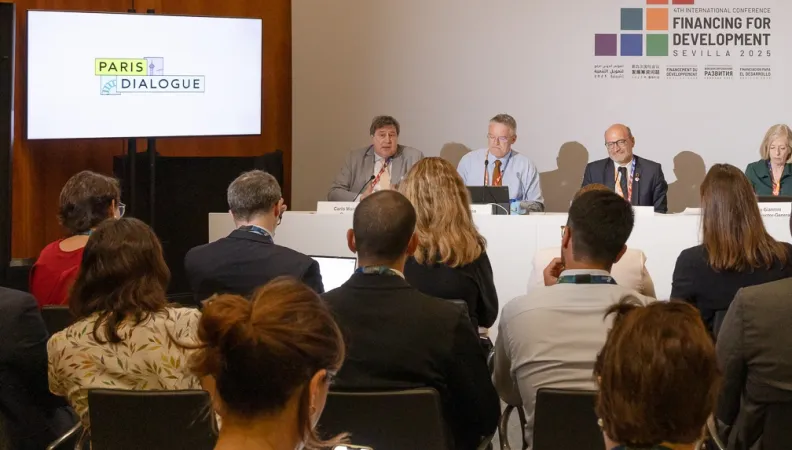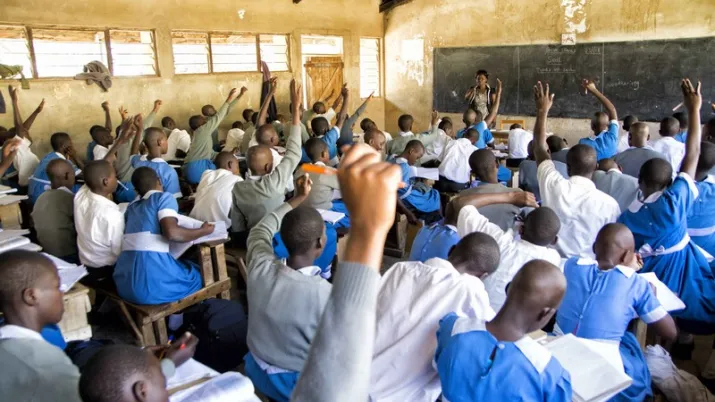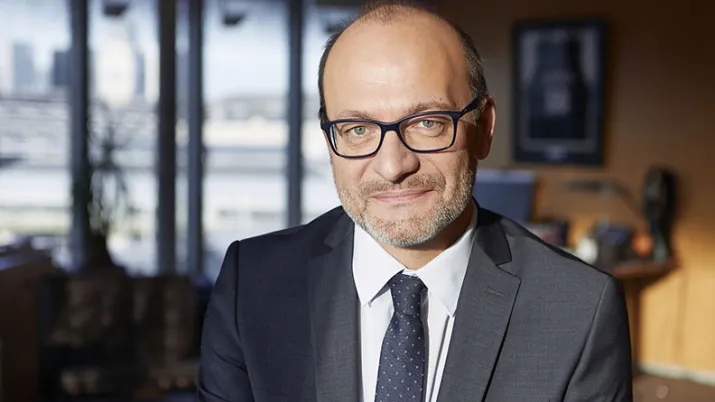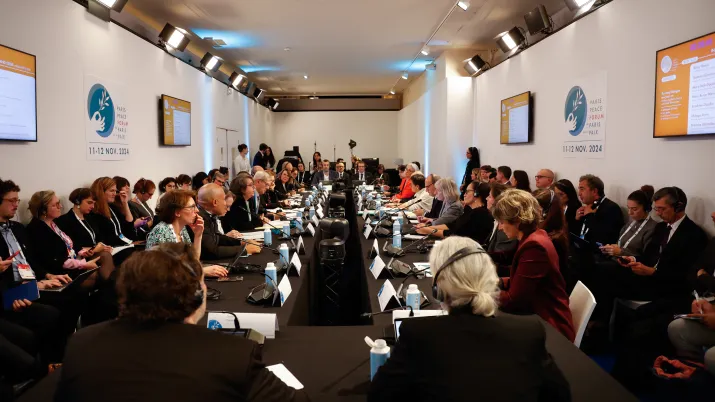Share the page
The Paris Dialogue: an international laboratory of actors committed to sustainable science and finance

The international community is celebrating three important anniversaries in 2025: the 10th anniversary of the Paris Agreement on climate, the 10th anniversary of the Addis Ababa Agenda, and the 20th anniversary of the Paris Declaration on Aid Effectiveness. These milestones remind us of the urgent need to rebuild frameworks for collective action on the systemic challenges that may prevent the Sustainable Development Goals (SDGs) from being achieved.
To provide a collective, structured and ambitious response to this need, by collaborating on concrete solutions and boosting the impact of financing for sustainable development, the heads of seven international agencies and organizations (UNESCO, OECD, AFD, CEB, ICC, IEA and OIF ) launched an unprecedented inter-institutional platform in 2023: the Paris Dialogue.
At the International Conference on Financing for Development (FfD4), held from June 30 to July 3, 2025, in Seville, the Paris Dialogue reaffirmed its ambition to become an innovative framework for joint work among Paris-based international and French organizations working in science, education and finance, with the goal of advancing international solidarity and sustainable transition.
A joint initiative to make Paris a world center for sustainable development
The Paris Dialogue is led by UNESCO, OECD, AFD, CEB, ICC, IEA and OIF with the support of the French Ministry for Europe and Foreign Affairs and the City of Paris. It is backed up by an extensive membership base and by participation of more than 30 institutions based in Paris. Its objective is to make Paris, which is already the host city to major international institutions, a true multi-actor and global platform for reflection and action on innovation.
The financial, scientific, educational and cultural expertise present in Paris will help co-construct concrete responses to major global challenges. The idea is to work better together, above and beyond the specific mandates of each organization, by developing a common agenda, shared projects and a process of collective learning.
A shared work program focused on international priorities
During the 2024-2025 period, the Paris Dialogue implemented a shared work program, based on four main priorities decided together by the partners.
The Paris Dialogue supports in-depth reform of the international financial system, with fairer and simpler tools adapted to the realities of every country. It encourages innovative and results-based financing as well as better coordination among public, private and multilateral actors. The objective is to enhance the impact and transparency of financing.
Education and culture are viewed as pillars of “just” transformations. The Paris Dialogue promotes access to knowledge, continuing training and culture for all. It supports more inclusive, modern and innovative educational and cultural systems.
The platform seeks to create concrete links among research, innovation and public action. It supports local initiatives, especially those led by young people and women. To this end, it counts on the circulation of ideas and on the responsible governance of new technologies.
The Paris Dialogue aims to make the city of Paris a common workplace for international organizations. It furthers exchanges among institutions, communities and universities and encourages development actors to make Paris their base and to work together.
Strategic mobilization as part of the Sevilla FfD4 and the Belém COP30
The fourth International Conference on Financing for Development (FfD4), held in Seville, Spain, was a major political step forward in collectively overhauling the financing mechanisms for sustainable development.
The Paris Dialogue works actively within the Sevilla Platform for Action by contributing in a structured, multidisciplinary and collaborative way to support the implementation and follow-up of the results of the FfD4 Conference. It also seeks to perpetuate the spirit of the Sevilla Platform of Action in terms of innovation, impact, principles and practice. Its action is based on the following:
- A joint call to action sponsored by all the partner institutions
- Concrete commitments documented in the co-constructed deliverables and projects
- Participation in theme-based side events (on culture, AI, youth, sports, health, social infrastructure and policy coherence)
- Positioning in line with those of major international coalitions (Pact for Prosperity, People and the Planet – 4P, Finance in Common Summit – FiCS, COP30, G7 2026).
The added value of the Paris Dialogue lies in its ability to create links between local and global levels and between political agendas and solutions on the ground.
Tangible deliverables, resulting from a collective approach
What sets apart the Paris Dialogue is its ability to generate concrete and monitored results that match shared priorities. Examples of initiatives already underway:
- AI policy toolkit (AFD–OECD cooperation): development of an evaluation tool and implementation guide to support the alignment of national sustainable policies on artificial intelligence (expected delivery in 2026).
- Global Sport Impact Fund (FiCS, AFD, UNESCO): the FiCS Sports Coalition, which includes AFD Group and UNESCO, will help boost investments in sports as a tool for the SDGs, in particular by giving structure to the Global Sport Impact Fund.
- APPRENDRE program (AFD–AUF): The APPRENDRE program provides support for the professionalization of teaching practices and the development of resources. Financed by AFD and implemented by Agence Universitaire de la Francophonie (AUF), it will continue to strengthen teaching practices and ensure that teaching is effective, relevant and adapted to local contexts in 26 French-speaking countries.
- Debt4Ed Swaps Initiative (UNESCO): a strategic initiative on the application of debt conversion for development as a financing instrument to catalyze investments in education.
- Revision of the Framework for Culture Statistics (UNESCO): a modernized tool to better promote cultural sectors in public policies.
- OECD–UNESCO report on the Multilateral Financing Gap for the SDGs
- Dialogue on investment in social infrastructure (CEB): Following the workshop on social infrastructure in April 2025, which brought together multilateral development banks and representatives of the South African presidency of the G20, the CEB will continue to organize exchanges on cooperation between development actors, with the aim of reducing the investment gap in social infrastructure. Joint participation in the following international summits: Paris Peace Forum, COP30 in Belém, Finance in Common Summit 2026, Olympism 365 Summit.
Each project is designed as a lever for collective learning and is carried out with an approach of openness and accountability.
A platform destined for action over the long term
In 2025, the Paris Dialogue was recognized as a priority initiative by the French Presidential Council for International Partnerships. It is now entering a phase of long-term structuring that includes:
- Strengthened governance and work by the founding members in committee form
- An annual work calendar including publications, events, and multi-stakeholder dialogues
- A shared monitoring and evaluation framework aligned with FfD4 commitments
- A post-FfD4 follow-up conference to be held in Paris in 2026, in conjunction with the French presidency of the G7
Press releases

The Seville conference: reshaping global financial architecture – Interview with Rémy Rioux
Published on june 28 2025


